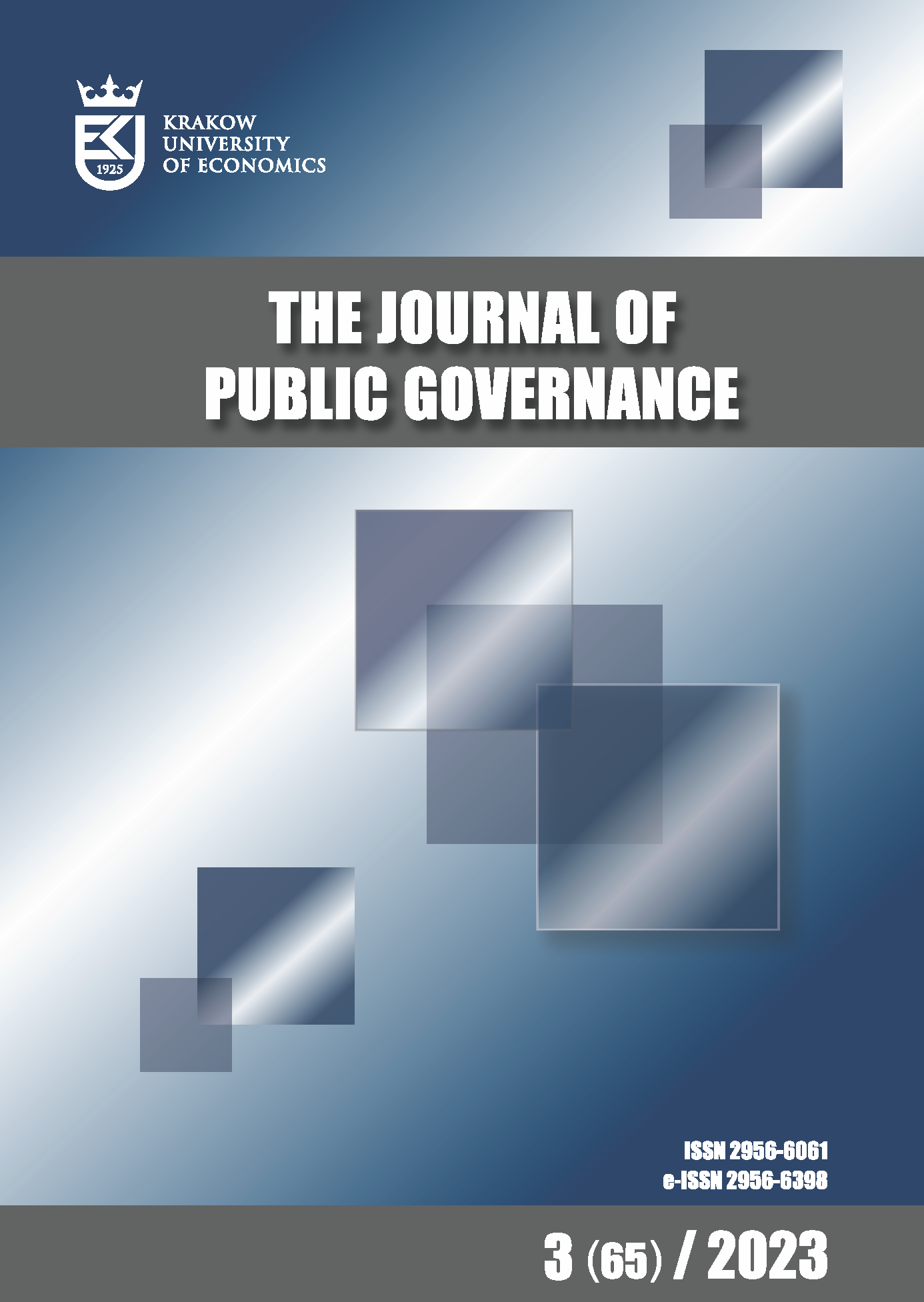Challenges to Performance Management in Health Care Entities During Crisis Situations
DOI:
https://doi.org/10.15678/PG.2023.65.3.02Keywords:
crisis management in hospitals, performance management in health care entitiesAbstract
Objectives: The article aims to identify the challenges faced by the management of health care entities – clinical hospitals – in evaluating their performance during crises. The research hypothesis posits that crises add new areas to the performance evaluation of health care entities – clinical hospitals – and alter their evaluation tools.
Research Design & Methods: The research was empirical, based on the reporting data for the period 2019–2021 (quantitative and qualitative) in selected clinical hospitals. The analyses were performed by an expert and included the perspective of a certified auditor and long-term researcher of issues related to the operation of health care entities – hospitals.
Findings: Health care entities in Poland, as public sector entities, incorporate crisis management requirements into their activities.
Implications / Recommendations: The results of the analyses are addressed mainly to the constituent bodies of health care entities, institutions affecting the operation of the health care system, and hospital managers.
Contribution / Value Added: It has been shown that crises add new areas to the performance evaluation of health care entities – clinical hospitals – and alter their evaluation tools.
Article Classification: research article
JEL classification: M40, M41, L21
Downloads
References
Betto, F., Sardi, A., Garengo, P., & Sorano, E. (2022). The evolution of balanced scorecard in healthcare: A systematic review of its design, implementation, use, and review. International Journal of Environmental Research and Public Health, 19(16), 10291. https://doi.org/10.3390/ijerph191610291
Buchelt, B., & Kowalska-Bobko, I. (2020). Zarządzanie zasobami ludzkimi w systemie ochrony zdrowia w czasach pandemii. Centrum Polityk Publicznych.
Chluska, J. (2007). Determinanty wprowadzenia rachunku kosztów działań w szpitalu. Zeszyty Teoretyczne Rachunkowości, 38(94), 25–35.
Chluska, J. (2022). The intellectual potential of employees in hospital crisis management during a pandemic. In P. Centobelli & R. Cerchione (Eds.), Proceedings of the 23rd European Conference on Knowledge Management, 23(1), 180–188. https://doi.org/10.34190/eckm.23.1.584
Czekaj, J., & Ziębicki, B. (2014). Ewolucja i dyfuzja koncepcji Performance Management. Organizacja i Kierowanie 3(163), 11–23.
Davoli, E. (2007). A practical tool for the preparation of a hospital crisis preparedness plan, with special focus on pandemic influenza. WHO Regional Office for Europe. Available at: https://iris.who.int/handle/10665/107809 [accessed: 26.04.2023].
Hass-Symotiuk, M. (Ed.). (2010). Koncepcja sprawozdawczości szpitali na potrzeby zintegrowanego systemu oceny dokonań. Wydawnictwo Naukowe Uniwersytetu Szczecińskiego.
Huczek, M. (2015). Zarządzanie kryzysowe w firmie a role i umiejętności menedżerskie. ZN WSH Zarządzanie, 3, 13–22. https://doi.org/10.5604/18998658.1173049
Jaworzyńska, M. A. (2015). Zastosowanie Strategicznej Karty Wyników w szpitalu – studium przypadku. Annales Universitatis Mariae Curie-Skłodowska, Sectio H – Oeconomia, 49(4), 177–184. https://doi.org/10.17951/h.2015.49.4.177
Kludacz, M. (2014). Zasady i etapy rachunku kosztów działań w angielskich szpitalach na potrzeby wyceny świadczeń zdrowotnych. Zeszyty Teoretyczne Rachunkowości, 76(132), 39–40. https://doi.org/10.5604/16414381.1107154
Mettler, T., & Rohner, P. (2009). Performance management in health care: The past, the present, and the future. In H. H. Hansen, D. Karagiannis, & H. G. Fill (Eds.), Business Services: Konzepte, Technologien, Anwendungen, 9. Internationale Tagung Wirtschaftsinformatik, Vol. 2 (pp. 699–708). Österreichische Computer Gesellschaft.
Mućko, & P., Hońko, S. (2014). Specyfika zrównoważonej karty dokonań w podmiotach leczniczych. In E. Nowak & M. Nieplowicz (Eds.), Modele zarządzania kosztami i dokonaniami. Prace Naukowe Uniwersytetu Ekonomicznego we Wrocławiu, 343, 431–439. https://doi.org/10.15611/pn.2014.343.39
Neely, A., Yaghi, B., & Youell, N. (2008). Enterprise Performance Management: The Global State of the Art. Cranfield School of Management, Cranfield University. https://doi.org/10.2139/ssrn.1289253
Ostrowska, S. (2013). Zmiana w zorientowanej na misję karcie wyników (MSC) i jej wpływ na zachowanie członków organizacji publicznej. Studia Ekonomiczne. Zeszyty Naukowe Wydziałowe Uniwersytetu Ekonomicznego w Katowicach, 168, 228–244.
Regulation of the Health Minister of 12th April 2017 on economic and financial factors needed to make analyses and forecasts concerning the economic and financial situation of independent public healthcare institutions, Dz. U. of 2017, item 832. Act of 26th April, 2007, on Crisis Management, Dz.U. of 2023, item 122.
Walas-Trębacz, J., & Sołtysik, M. (2014). System zarządzania kryzysowego w przedsiębiorstwie. Organizacja i Kierowanie, 4(164), 85–100.
Zelek, A. (2003). Zarządzanie kryzysem w przedsiębiorstwie – perspektywa strategiczna. Wydawnictwo ORGMASZ.
Zelman, W. N., Pink, G. H., & Matthias, C. B. (2003). Use of the balanced scorecard in health care. Journal of Health Care Finance, 29(4), 1–16.
Downloads
Published
Issue
Section
License
Copyright (c) 2023 Krakow University of Economic

This work is licensed under a Creative Commons Attribution 4.0 International License.



